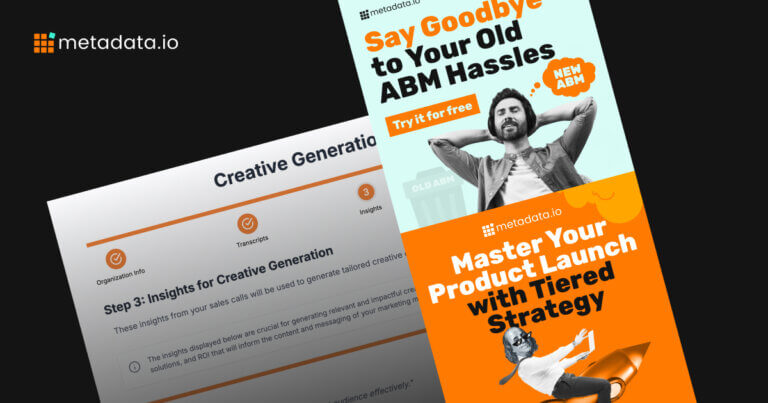The future of the marketing technology landscape is autonomous
Today marks a big milestone for Metadata as we announce the closing of our $6.5m Series A.
This marks a new stage for our company as we transition to our go-to market motion, and strive to introduce our technology and practice to the public, leveraging our early adopters as our advocates.
Companies like Drift, Pendo, Zoom and 100+ others trust the Metadata platform to execute hundreds of experiments, fine-tune their marketing mix, and produce a predictable pipeline that translates to revenue.
It’s been a long road to reach this point, but the need for augmenting human marketers with 100x execution capability is taking off.
We are excited to join the Resolute family, and welcome new support from York IE and Stormbreakers. I’m also proud to have entrepreneurs such as Mark Organ and Ilya Volodarsky share our vision and invest in the round. Finally – I’m humbled by our customers (UpKeep, UIPath, and SocialChorus to name a few) and employees who participated and put their trust in the company.
Over the last six months, we’ve been tracking ahead of our goals: inbound demand, demo requests and pipeline have surpassed our expectations by 2-3x. While the world changes, we are changing with it. Metadata is at the center of the digital transformation, replacing clunky legacy procedures with new, agile processes, and putting AI and experimentation at the center of operations.
In today’s world, being able to adapt to change, leverage data, and be truly experimental is key to staying ahead. This agility is written into Metadata’s DNA: it’s practiced throughout the company, and evidenced in our product and customer success. With artificial intelligence becoming more of a status quo, I am very excited about our opportunity!
The time is now
In our industry, the most dramatically changing field is audience targeting. In the last few months, the work environment drastically changed, exposing the weaknesses of traditional IP- and cookie-based targeting. Our technology was positioned better than any other to adapt to this charge. With this funding comes confirmation from the capital markets that we are doing the next big thing.
The $6.5 million raised in this round will allow Metadata to broaden its potential as an autonomous demand-gen platform. In an industry of over 8,000 martech vendors, Metadata raised this round during a downtime, while many other vendors saw declines, wrestled with underfunding, and experienced longer cycles. We are on a path to change the status quo, transcending the constraints of traditional demand gen and enabling autonomous marketing to become a reality. Our recent funding solidifies the notion that we are heading in the right direction, shaping an autonomous martech landscape for the future.
When we started Metadata four years ago, we focused our efforts on our technology and customer development. Today, after perfecting product-market fit and bringing in exceptional talent, our demand has sky-rocketed and isn’t showing signs of slowing down. Because of this accelerated momentum from customer demand, we are able to fuel our go-to-market motion and to establish category leadership.
Metadata is synonymous with demand gen. We aren’t just another marketing technology. We’re disrupting the traditional ABM space and redefining how to look at marketing in a customer-centric way. We’re removing human error from the equation and replacing it with AI automation that matches the scale needed in today’s marketing technology.
B2B Marketer Obstacles and Why ABM Isn’t Working Optimally
Technology is only as good as its user. The move to automate is more than a way of removing some of the tedium from marketing–its bigger goal is to improve reliability. We have found that human error is often the biggest barrier to scalability and optimization. If you can eliminate the mundane tasks most vulnerable to mistakes, you can free up time for the marketer to focus on what they do best— strategic and creative tasks.
Our value prop is to replace the monotonous parts of ABM, and transform B2B marketing through AI and automation. Instead of manual inputs primarily operating sales and marketing technologies, AI and experimentation are driving the car, increasing the accuracy and versatility of performance.
Metadata doesn’t compete with the other marketing technologies; we enhance their operations and maximize their utilization. Too many companies invest in middleware that takes advantage of their martech stacks but ultimately adds little value. Metadata generates an ROI on every previous investment.
How To Transform ABM As We Know It
Since Metadata’s inception, we have strived to disrupt the marketing space. We injected experimentation software into account-based marketing, long before marketers ever realized how essential experimentation might be. In the first two years of existence, we chose the ABM marketing archetype as the first use case. Our goal is to apply this technology not just to ABM, but to brand awareness, sales acceleration, general demand generation, and other sectors of the marketing ecosystem.
Meanwhile, the ABM category is consolidating. We saw this with the Demandbase Engagio acquisition. We should anticipate more acquisitions in the space, as more incumbents look to become an “all in one” unified platform and absorb smaller, differentiated competitors. While ABM consolidates into fewer players, new categories will arise. The intersection of AI, Data, and RPA (e.g. UiPath & Automation Anywhere) creates a perfect environment for autonomous marketing technologies: platforms can operate many of today’s mundane and repetitive marketing tasks at a speed, scale, and accuracy that humans simply can’t.
To the Future
This latest investment is a vote of confidence that people beyond marketers believe in Metadata. It’s a validation of the path that Metadata is setting. Their demand is the real proof–the increase in customers in the last three months speaks most strongly to their belief in what we do. We’re crossing the chasm, from visionaries and early adopters to pragmatists.
The future of the marketing technology landscape is autonomous at its very core. It will become the status quo to implement Metadata as the execution layer to connect the marketing stack. It is the marketer that’s needed for the future.



